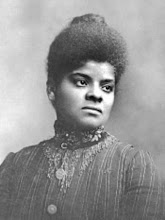Ida B. Wells was a woman of substance, conviction and determination. Born just before the Emancipation Proclamation in Holly Springs, Mississippi in 1862 to freed slaves James and Elizabeth Wells, Ida was one of eight children. When she was 15 or 16 years old her parents and one of her siblings died in a Yellow Fever epidemic. At the risk of having her family torn apart even more Wells took it upon herself to get a job teaching so she could support her siblings and keep the family together.
Wells' formative years with her parents instilled in her a sense of conviction to fight for what she believed in and towards justice for herself and others. In 1880 she moved to Memphis and began taking classes at Fisk University. She was more interested in creating a life of purpose for herself than she was in securing a husband. She is quoted as saying "I will not begin at this late day by doing what my soul abhors; sugaring men, weak deceitful creatures, with flattery to retain them as escorts or to gratify a revenge."
While in her early twenties life took a definitive turn for Wells during a random moment in her daily routine. Accustomed to riding the train back and forth one day on the Chesapeake, Ohio and Southwestern Railroad train she was asked to give up her seat for a white man and move to the Jim Crow section. Wells refused even to the extent of biting the hands that tried to remove her. It took three men to forcibly move her. Aware that the Supreme court has recently banned segregation in public places Ida returned and hired a lawyer to sue the railway. She won her case in a local court but the Tennessee Supreme Court reversed the ruling based on her supposed poor intentions. Ida B. Wells continued her defense and wrote a newspaper article about her treatment.
Her journalistic career took off. She had a voice with a message and blacks and Christians wanted to hear more from her. In 1889, she helped found an anti-segregationist newspaper in Memphis called Free Speech.Despite the growing public awareness Ida persisted in writing about racial injustice for newspapers in Memphis, Philadelphia and Chicago. When three of her friends who owned a black grocery store were lynched by w white mob under the pretexts of having raped a white woman, Ida turned her focus to researching and writing about the lynching epidemic. She believed that the root causes behind lynching had nothing to with interracial sexual relations but were more a result of white fear of black economic progress. Her encouraged blacks to stop feeding the local economy and to leave Memphis because it was not a place the promoted justice for blacks. Her own writing eventually drove her out of Memphis when her newspaper was destroyed and her life threatened.
Wells became very instrumental in educating both Americans and Europeans about lynching in the South. She became President of the Anti-Lynching Crusade and worked with Frederick Douglas to write about these issues. Along with other supporters Wells and Douglas boycotted the 1893 World's Columbian Exposition in Chicago. While in Chicago Wells also helped start women suffrage organizations. She worked with Jane Addams to secure disegregation in Chicago's public schools.
In 1995 Wells married attorney and editor of the Chicago Conservatory newspaper, Ferdinand L. Barnett. He also happened to be the President of the Ida B. Wells club in Chicago. Wells had four children with him but always struggled to balance the demands of domestic life and her vocation to write and speak out for racial justice. She took her children on her speaking engagements and was one of the first American women to keep her maiden name in marriage, always recognizing her self-identity as a woman fighting for justice and equality.She covered this struggle in her autobiography under a chapter called "A Divided Duty."
Wells traveled to Europe twice speaking and raising awareness and support against lynching practices. Before her second trip she took the initiative to contact the editor of the Daily Inter-Ocean, the only white American newspaper writing openly and consistently about lynching. The editor asked her to write a column while she was away and Wells became the first paid black female foreign correspondent writing for an American white newspaper.
Ida B. Wells worked with and influenced the likes of Fredick Douglass, W.E.B Dubois and many others in the right for racial and gender equality. She was one of only two Black women to help found the NAACP in 1909. She was also one of the few women who spoke out openly against the pedagogical and sociopolitical beliefs of Booker T. Washington.
Wells worked till her end. In 1930 at the age of 67 she ran for state legislature in Illinois, becoming one of the first black women run for US public office. She died a year later in the midst of writing another of several books.
To learn more about this beautiful black woman please visit the Ida B. Wells Memorial Foundation created and maintained by the Ida B. Wells Family. http://www.idabwells.org/
Monday, December 14, 2009
Subscribe to:
Post Comments (Atom)







Thank you for introducing me to Ida B. Wells. What a pleasure!
ReplyDelete